How Meditating Helped a SWAT Team Perform Better
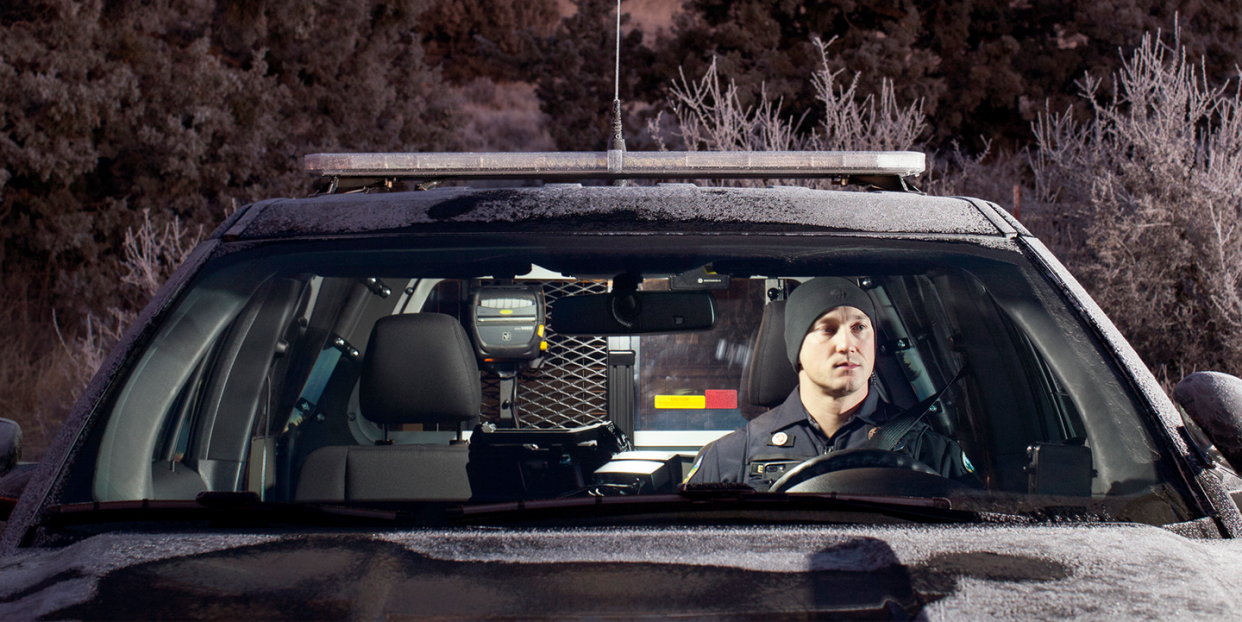
Early on a cool, blue afternoon, Officer Eric Russell (that's him, above) slides behind the wheel of his police cruiser and pulls away from the precinct, straight into Friday gridlock. Just nine hour removed-the minimum downtime allowed-from an 18-hour SWAT-team assignment, he is starting his patrol of Hillsboro, Oregon, a city of some 100,000 about 15 miles west of Portland. You’d think he would be exhausted, but his eyes, bright and clear, shift seamlessly from the digital river of info filling his dashboard computer monitor to the streetscape unspooling beyond his windshield: a teenager tortoising into his hoodie as the cruiser rolls by; a driver fielding a text while veering out of her lane; a citizen frowning, disdainful of cops in this bleak season of Baltimore and Tulsa, Staten Island and Ferguson.
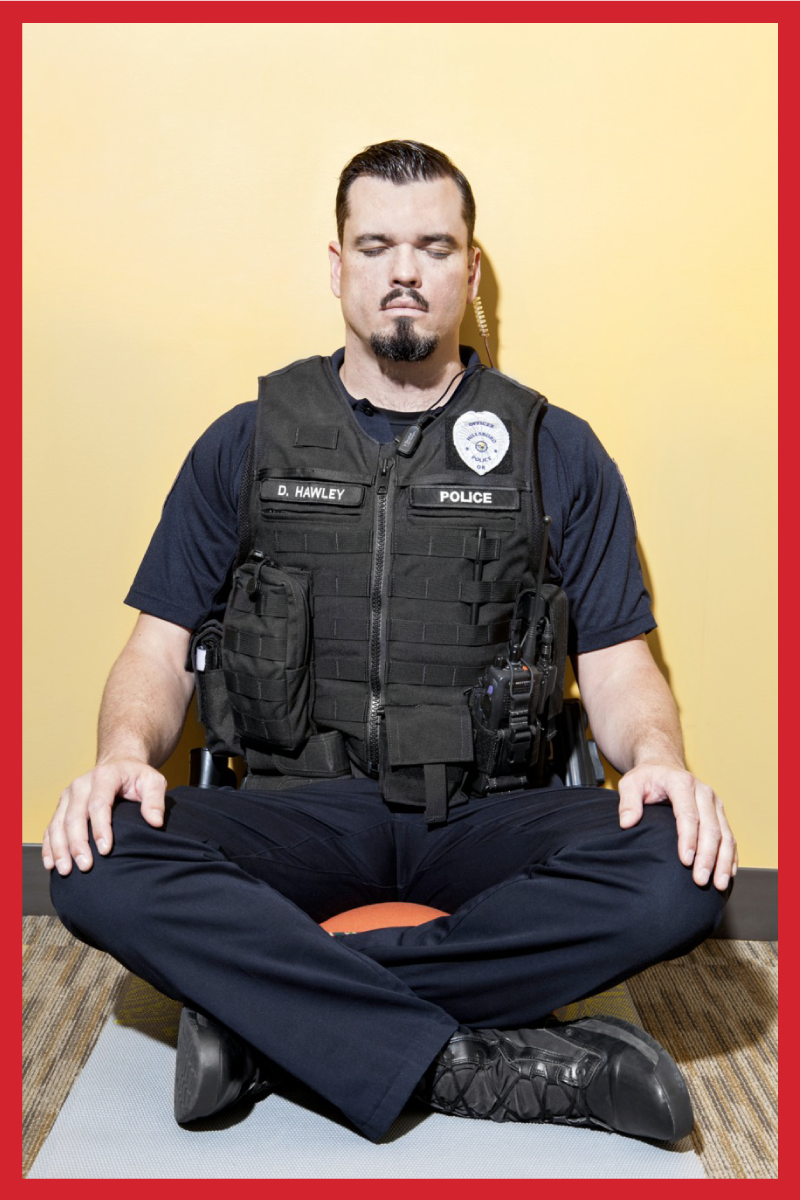
The previous night, a suspect in a homicide case had been reported to be armed and en route to a house. Russell’s SWAT team was deployed to intercept him. Seven beefy officers in body armor, crammed cheek to jowl in a minivan, waited for seven hours. The suspect failed to show. “Turned out to be a goose egg,” Russell says.
To relieve that kind of tension, some officers might hit the gym to slam barbells; others might crack a fifth of Jameson. But Russell, a thickly muscled, luxuriantly tatted 34-year-old former Marine Corps sniper, drove home, let the dogs out for a few minutes, and then climbed into bed beside his girlfriend. He quickly fell asleep.
One reason he’s resilient to the stress of work and able to recharge: mindfulness meditation, he says. “Meditation helps me keep things in their right box,” he says. “I’m able to fully engage in a situation without letting it eat away at me afterward. And when I’m engaged, I can step back-sometimes just for an instant. I can think instead of reacting.”
So often in America, making split-second decisions under life-or-death pressure, police officers must react first and think later. According to data compiled by The Washington Post, police fatally shot 987 people in 2017, 24 more than they killed in 2016, and 20 of those shot and killed were unarmed. The killing have provoked widespread protests, federal reviews and the Black Lives Matter movement. A Gallup poll reported that over the period of 2015 to 2017, just 54 percent of Americans had a high degree of trust in police; among black men and women, that figure was 30 percent. The stress cuts both ways: Research has shown that the pressures of law enforcement put officers at risk for high blood pressure, insomnia, heart disease, PTSD, and suicide.
Lt. Richard Goerling, 49, of the Hillsboro Police Department, who codesigned the class in which Russell learned to meditate, explains that instead of trying to eliminate or lessen the mental baggage that an officer may bring to a confrontation with a member of the public, mindfulness training teaches an officer tbe aware of and regulate his or her baggage to focus on the moment. The idea makes sense. Clarity and nonjudgment help defuse any kind of confrontation. Taught systematically, on a large scale, these skills could even help save lives.
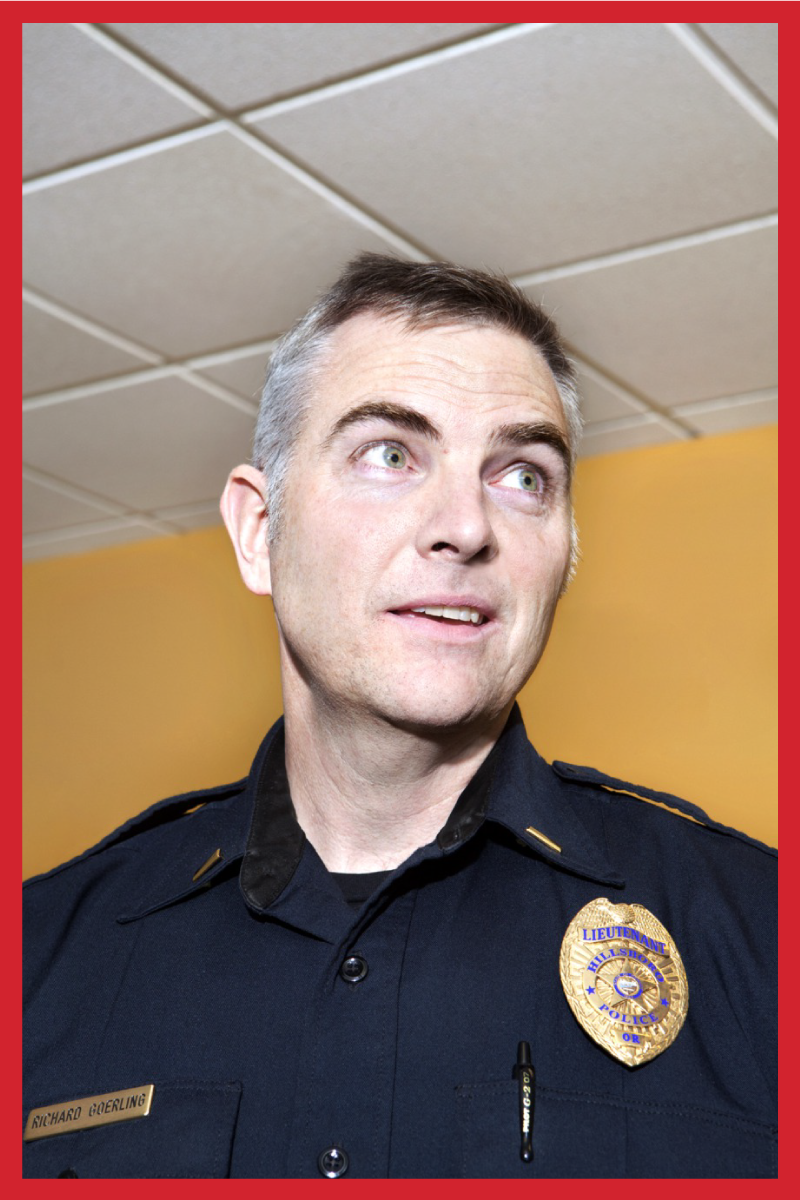
Goerling’s program employs mindfulness-based stress reduction, or MBSR, developed by Jon Kabat-Zinn in 1979. MBSR draws on techniques developed in the Buddhist traditions of Asia. “Simply put, mindfulness is moment-to-moment awareness,” Kabat-Zinn wrote in his book Full Catastrophe Living. “It is a systematic approach to developing new kinds of control and wisdom in our lives, based on inner capacities for relaxation, paying attention, awareness, and insight."
Since Goerling introduced the program in Hillsboro in 2013, the training has spread to other police departments in Oregon (Portland, Bend), California (San Diego, El Cerrito, Menlo Park, Emeryville), Wisconsin (Madison), and elsewhere across the nation. “For years, practitioners in the field searched for a way to reach the predominantly male law-enforcement and first-responder communities,” says Steven Hickman, Psy.D., a clinical psychologist and founding director of the UC San Diego Center for Mindfulness, “but we lacked the credibility, the vocabulary, to get through to them. Rich has been able to bridge that gap. Most men, especially men in a traditionally macho culture like law enforcement, aren’t comfortable with the terminology of mindfulness. Concepts such as self-compassion sound off-putting.”
At first, Russell was one of those skeptics. “The concept sounded sketchy to me,” he says. “I had my experience and training as a Marine to draw on. I work out and try to eat right. I felt like I was already in balance. I didn’t think I needed meditation. But Rich wanted a military veteran to be in his program. Anybody else asking, I would have said no. But I respected Rich’s work on the force. He’d been my commander, and he always had my back.”
Goerling takes a different view of Russell’s early experience with the training. “From my perspective, mindfulness resonated with him from the start, in particular with his warrior background," he says. “Eric came aboard the force from the Marine Corps, as a tenured combat veteran. I believe he was struggling to integrate the two cultures. Over time, he demonstrated that he believed mindfulness was a skills training that brought police officers closer to a warrior ethos and standard of both badassery and humanitarianism that many in his combat-veteran tribe expect in policing in America. He became a quiet practitioner and champion of mindfulness skill-building and influenced many.”
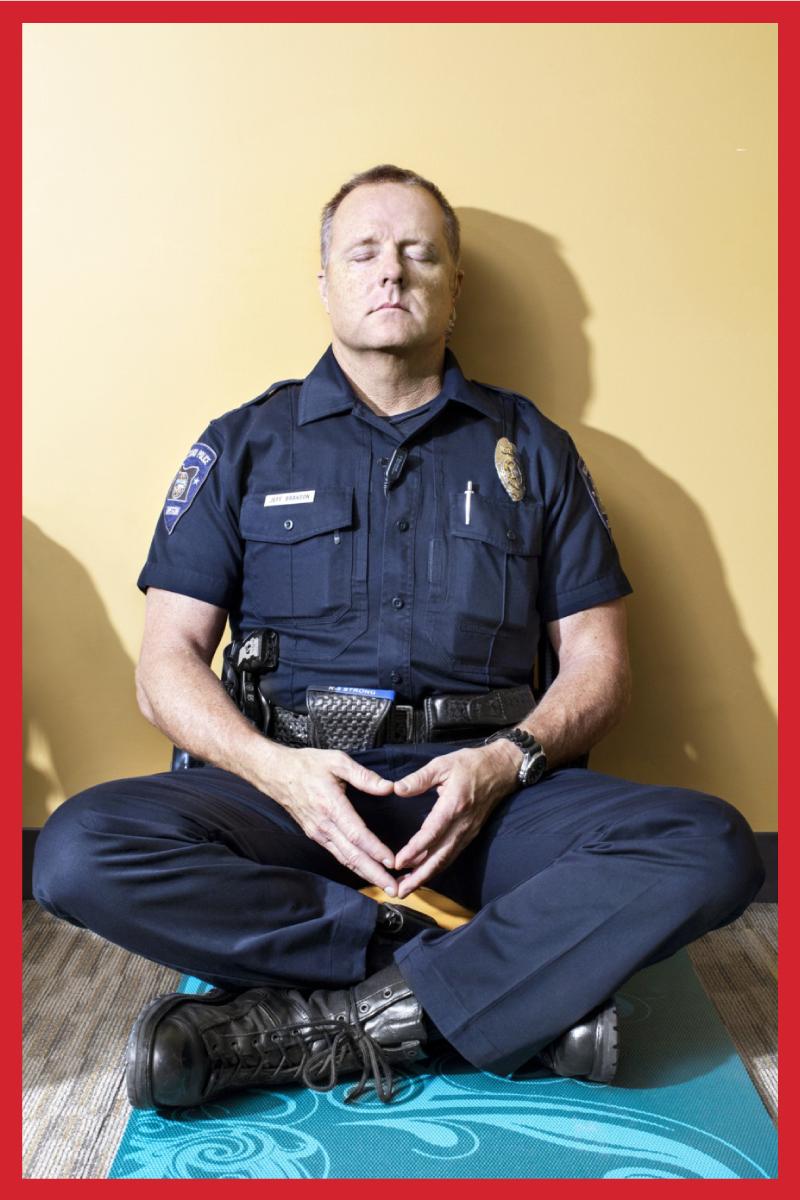
Russell’s initial doubt is typical of most American men. Hickman estimates that 70 to 80 percent of his mindfulness-class attendees are women. A recent National Institutes of Health study showed that meditators are more likely than non-meditators to be middle-aged, white, female, college educated, and living in the western U.S.
While mindfulness training stresses non-attachment, it also teaches people to move through negative thoughts and feelings instead of trying to escape them. Hickman explains the apparent paradox. “What we resist persists,” he says. “An effort to push away a negative thought or emotion only magnifies it, Mindfulness meditation teaches you to observe your thoughts rather than become your thoughts. In the silence of meditation whatever issue you’re dealing with-from a ringing in your ears to an argument with your girlfriend-will inevitably rise front and center in your consciousness. There’s no point in denying the presence of the thought or the feelings; they’re going to be there anyway. If you engage with your pain, observe it without judgment, then you can begin to see options for working with it differently.
The negativity moves through you instead of taking root. I taught one man, a very tough guy, a former wrestler and football player, who’d gotten injured and suffered intense chronic pain for 15 years. ‘All those years I was fighting my pain and losing,’ he said. ‘Meditation taught me how to dance with it instead.’ ”
Goerling points out that this runs counter to the basic male MO. “We typically spend our entire lives running away from our emotions, denying them through work, sex, beer-you name it.”

As a Coast Guard Officer earlier in his career, Goerling lifted Haitian and Cuban refugees out of the Caribbean and Chinese boat people out of the Pacific. He spent hundreds of hours on watch patrolling the Alaskan coast, studying the dip, rise, and shifting lights of the ocean. “People often ask me how long I’ve been meditating,” Goerling says. “I tell them, ‘My entire life.’”
After leaving active duty in the Coast Guard in 1995 and following a stint as an investigator for the U.S. Department of Transportation in Los Angeles, Goerling returned to his nativePortland area to join the Hillsboro Police Department. As he rose through the ranks, he watched Hillsboro grow from a largely white agriculture-based town into a multiracial city and saw the police force undergo a troubling shift. “I met younger guys, police with just a few years’ service, who had grown as callous and cynical about their work as 20-year veterans,” Goerling says. “I could understand it.” The drug problem had intensified, he explains, and there was an explosion of calls involving people with mental-health issues. There was new technology to master; there were different cultures to understand. Officers were beginning to feel overwhelmed.
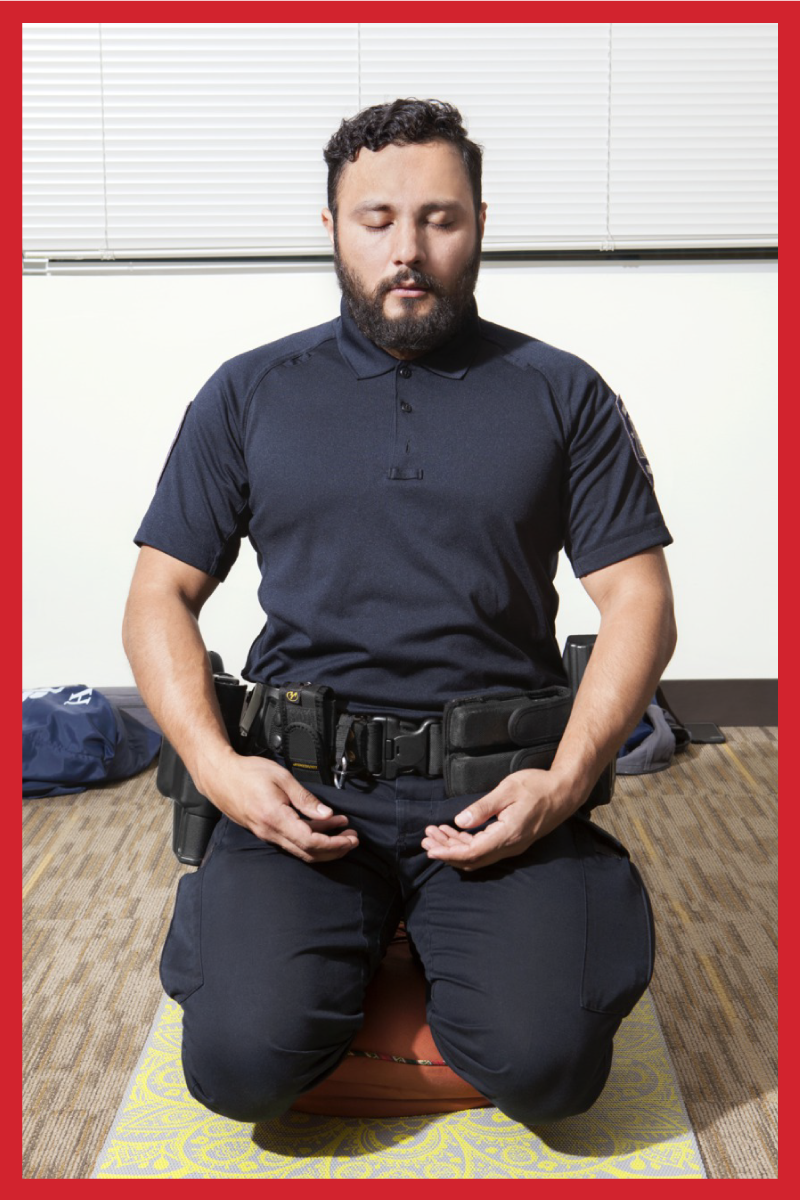
Searching for ideas that would help, Goerling came across mindfulness training, which was just reaching mainstream acceptance. He learned that meditation had roots in the ancient warrior cultures of Japan. Elite units of the U.S. military practice it; so do professional athletes. So he decided to try it. “In some ways, it was the hardest thing I’ve ever done,” Goerling says. “Meditation seems so simple. Sit still, attend to your breathing, let your thoughts come and go. But for me and maybe for most men, that was incredibly difficult. Midway through my first six-hour intensive, I thought I was going crazy.”
But he persevered. “One day, sitting in meditation, it hit me. I was actually in the moment. I wasn’t going with my fantasies, or judging myself or others.” He quickly saw the potential benefits for police work. “Here was a practice that addressed the static, the guilt, the negative judgment-all the distrust and anger that build up every day from having to deal with addicts, abusers, repeat offenders."
Goerling tried to interest police leadership in his newfound performance skill, without success. But then, in January 2013, a respected member of the Hillsboro force came home on a Sunday night and went berserk. He took his wife and children hostage at gunpoint. A SWAT team was called in, but negotiations failed. The officer started shooting. The tactical team returned fire: 100 rounds ripped though the house. Finally, the cop released his family and surrendered. Miraculously, there were no serious physical injuries. But the department was shaken to its core.
Goerling saw an opening. He believed job stress contributed to the officer’s breakdown and couched his pitch in terms of resilience and enhanced performance. “My credo had always been to stuff my emotions and not admit any weakness,” says Officer Stephen Slade, 47, a hulking bear of a man. “I listened and thought,‘What the hell, meditation might make me a better sniper.’ ”
So in March 2013, Slade, Russell, and other officers pulled on sweatpants and reported for duty at a yoga studio. The first task: Objectively study a raisin. “It was hard to keep a straight face,” Russell says of the exercise, which is designed to focus attention. Next: Close your eyes and pay attention to your breathing. Feel the air .ow in and out of your lungs. Lay your hand on your diaphragm and feel it expand on your inhale and contract on your exhale. Let your thoughts come and go. Don’t try to stanch the torrent rushing through your brain. Just observe your thought stream; when you get distracted, concentrate on your breathing.
Skeptical but willing, Russell committed to the program-a two-hour class every week for two months, culminating in a six-hour intensive session. “I gave it my best shot, but my inner voice never stopped yammering,” Russell says. “Sometimes, trying to focus on my breathing, I would just fall asleep.”
But near the end of the training, some officers reported breakthroughs. Slade, for one, began to see that his wall of stoic denial had taken a toll on his wife and kids. Sgt. Rohn Richards, 53, a self-described “knuckle dragger,” discovered that mindfulness enhanced his focus in all aspects of life. “I tend to chase bright, shiny objects,” Richards says. “Meditation has helped me lock in on the moment, to listen better at home and on the job. It’s helped make me a better man, and that can’t help but make me a better police officer.”
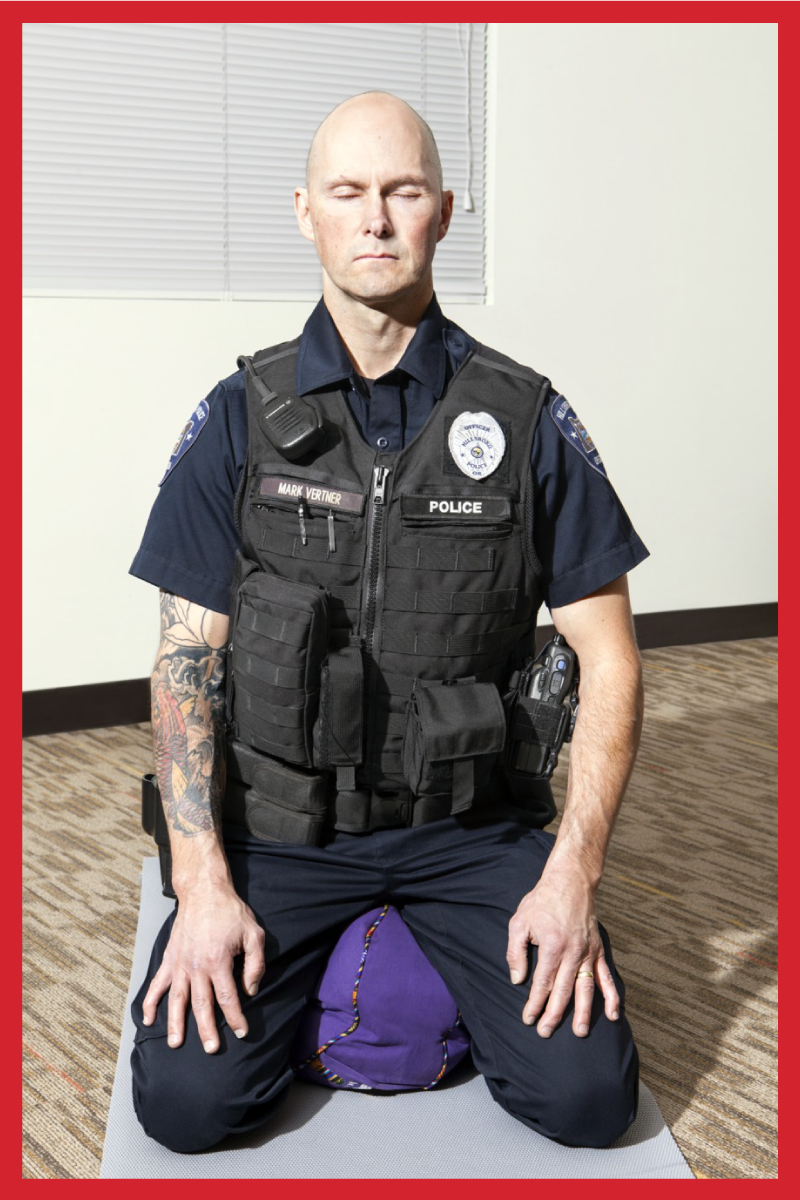
Russell, for his part, valued some of the techniques he’d picked up through the training (notably the body scan-the tensing and relaxing of isolated muscle groups) but, at first, didn’t regard the experience as career-changing. As the weeks went by, however, his attitude started to shift; he began to recognize that mindfulness in fact offered a means of blending the “badassery” of the warrior ethos with the disciplined dispassion of a public servant.
“I find now that I can let things go,” Russell says. “I get it: The stress of this job sneaks up on you. Year by year, it eats away at you. You have to find a way of both protecting your core and staying open. Otherwise you don’t notice the corrosion, the callousness, until it’s too deep to deal with. Then you get bitter. You start resenting and judging the people you’re sworn to protect and serve. Meditation teaches you to stay nonjudgmental, which is the heart of police work.”
Originally published in the July/August 2018 print edition of Men's Health.
('You Might Also Like',)

